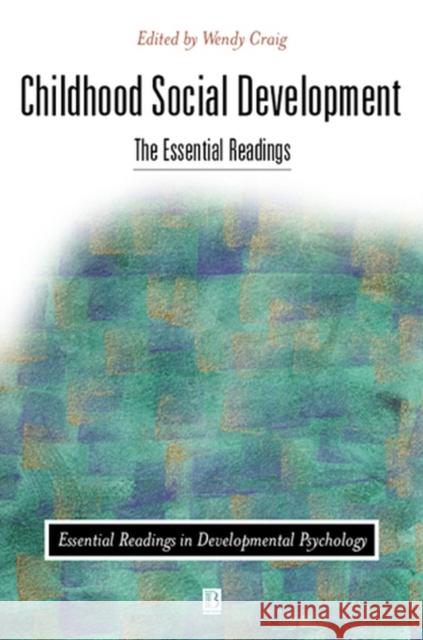Childhood Social Development » książka



Childhood Social Development
ISBN-13: 9780631217411 / Angielski / Miękka / 2000 / 388 str.
Childhood Social Development
ISBN-13: 9780631217411 / Angielski / Miękka / 2000 / 388 str.
(netto: 239,86 VAT: 5%)
Najniższa cena z 30 dni: 249,28
ok. 30 dni roboczych.
Darmowa dostawa!
Childhood Social Development: The Essential Readings provides students with a selection of some of the key articles by key researchers in this core area of developmental psychology.
"This book provides a useful introduction to current themes in social development research. It will provide relevant background material for anyone interested in finding ways to promote social and emotional intelligence in children." Claire Chapman, Brighton and Hove, Educational Psychology in Practice, Vol. 16, No. 4, 2000, p.497–8.
Preface.
Introduction: What is Social Development: Craig, W. M.
Part I: Social Relationships:.
1. Attachments: Infant–Mother Attachement: Ainsworth, M. D. S.
2. Parenting: Supportive Parenting, Ecological Context, and children′s Adjustment: A Seven Year Longitudinal Study: Pettit, B. S. Bates, J.E & Dodge, K. A.
3. Friendships: The Company They Keep: Friendships and Their Developmental Significance: Hartup, W.
4. Peer Relations Preadolescent Friendship and Peer Rejection as Predictors of Adult Adjustment: Bagwell, C.L., Newcomb, A. F., & Bukowski, W. M.
Part II: The School Context:.
5. Bullying and Victimization: Observations of Bullying and Victimization on the Schoolyard: Craig, W. & Pepler, D. J.
6. Friendship and School Adjustment: Friendship Quality as a Predictor of Young Children′s Early School Adjustment: Ladd, G., Kochenderfer, B. & Coleman, B.
7. Extracurricular Activities: Do Extra Curricular Activities Protect Against Early School Drop Out?: Mahoney, J. L. & Cairns, R. B.
Part III: Gender Identity, The Self, and Moral Development:.
8. Gender Differences: Gender and Relationships: Maccoby, E. E.
9. Self Concept: Structure, Stability, and Development of Young Children′s Self Concepts: A Multicohort Multioccasion Study: Marsh, H. W., Craven, R., & Debus, R.
10. Moral Reasoning: Children′s Reasoning about Interpersonal and Moral Conflicts: Smetana, J. G. Killen, M. & Turiel, E.
Part IV: Aggression:.
11. Forms of Aggression: Engagement in Gender Normative Versus Nonnormative Forms of Agression: Links to Social–Psychological Adjustment: Crick, N. R.
12. Development of Antisocial Behavior: A Developmental Perspective on Antisocial Behaviour: Patterson, G. R., Debaryshe, B. & Ramsey, E.
13. Prevention of Conduct Disorders: The Role of Social Context in The Prevention of Conduct Disorder: Coie, J. D. & Jacobs, M. R.
Index.
Peter K. Smith is Professor of Psychology and Head of the Unit for School and Family Studies at Goldsmith′s College, University of London. He is co–author of the leading textbook ′Understanding Children′s Development′ (Third Edition, Blackwell Publishers, 1998), among many other books and articles.
Craig H. Hart (Ph.D., Purdue University, 1987)is Professor and Chair of the Marriage, Family, and Human Development department at Brigham Young University, Provo, Utah. He has co–authored 50 scientific papers and three edited volumes on children′s social development and early childhood education practices. He is associate editor of Early Childhood Research Quarterly.
This volume provides an authoritative and up–to–date overview of research and theory in childhood social development from pre–school age to the onset of adolescence. Chapters are contributed by experts in the field from Australasia, Europe and North America and cover 30 topics currently of importance in the field, in terms of research, applied research and policy.
The Handbook starts with an historical overview and follows with major sections. The first focusses on a variety of disciplinary perspectives. Following sections address influences on development, the family context, the peer group, social skills and social cognition, play, helping and moral reasoning, as well as cooperation, competition, aggression and bullying. These, in addition to the final section on children with special needs, make this volume appropriate for practitioners who deal with children as well as for college and university teachers, researchers, and advanced undergraduate and graduate students. Each chapter summarises existing knowledge in the field, synthesising the latest research in an accessible manner, whilst also highlighting areas of growing debate. Integration and coherence are provided by editorial commentaries prefacing each section.
Peter K. Smith is Professor of Psychology and H... więcej >
1997-2026 DolnySlask.com Agencja Internetowa
KrainaKsiazek.PL - Księgarnia Internetowa









